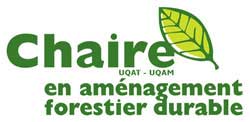Role of Riparian buffers as a tool to preserve aquatic ecosystems, maintain biodiversity and promote connectivity in the boreal forest
- Direction : The student will be supervised by Miguel Montoro Girona (UQAT) and Guillaume Grosbois (UQAT). Therefore, Kaysandra Waldron (Natural Resources Canada) and Gabriel Pigeon (UQAT) will be collaborators of this project.
- Institution : UQAT
- programme : Ph.D environmental sciences
- Support financier : scholarship of 24 000 $ by year for 3 years is provided
- Date d'inscription : August- September 2025
- Offre en format pdf: Télécharger
Forest harvesting has a major impact on nearby aquatic ecosystems, leading to nutrient and sediment inputs and changes in the food chain. To protect these environments in Quebec forests, a 20-meters forest strips must be maintained along the edges of harvested areas. These residual forests are known as the riparian buffers.
The riparian buffers along all watercourses, lakes and wetlands represent 10% of Quebec’s Forest. Their main function is to protect aquatic ecosystems, but they may help maintain biodiversity after forest harvest, thus playing a key role in connectivity. However, their long-term role remains uncertain.
The aim of our project is therefore to assess the role of riparian buffers in preserving aquatic ecosystems, maintaining biodiversity (plants, birds, mammals), and ensuring forest stands connectivity 20 years after clearcutting in Canadian boreal forests.
Profil recherché
- Education: A good or excellent academic record. Master's degree in ecology or forestry with an interest in natural disturbances and silviculture effects in a context of sustainable forest management in the face of climate change.
- Requirements: A valid driver's license, the ability to work in a multidisciplinary team and the willingness to conduct fieldwork in remote locations. Teamwork capacity. Skills in statistical analysis and scientific communication will be considered in the selection process. We are looking for a dynamic, autonomous, responsible and motivated person. The applicant must be systematic and accurate, in combination with a curious and critical mindset, be good at cooperation yet also be capable of working independently.
- EDI’s principles: Priority will be given to candidates from under-represented groups (Aboriginals, ethnic and visible minorities, LGTBI, women).
Lieu
The student will be based at GREMA (https://www.uqat.ca/recherche/grema/ ) at the Forest Research Institute (IRF; https://www.uqat.ca/programmes/irf/) on the Amos campus of the Université du Québec en Abitibi-Témiscamingue (Quebec, Canada). The IRF is dynamic, multicultural and international research group that provides a high-quality environment for students to develop their research, with 12 professors and more than 60 graduate students working on a wide range of topics such as forest dynamics, silviculture, genetics, biodiversity, ecophysiology and sustainable forest management. IRF students also benefit from professional development resources and opportunities (scholarships, participation in conferences, workshops) offered by the Centre for Forest Research (www.cef-cfr.ca). In addition, the student will be a member of the cold forest- international research group (https://forets-froides.org/). As part of this project, the student will also have the option of completing an international internship funded in Europe.
Direction
The student will be supervised by Miguel Montoro Girona (UQAT) and Guillaume Grosbois (UQAT). Therefore, Kaysandra Waldron (Natural Resources Canada) and Gabriel Pigeon (UQAT) will be collaborators of this project.
Renseignements
Send an email including a curriculum vitae, a cover letter, an academic transcript and the names of two referees to miguel.montoro@uqat.ca and guillaume.grosbois@uqat.ca
Retour à la liste des offres